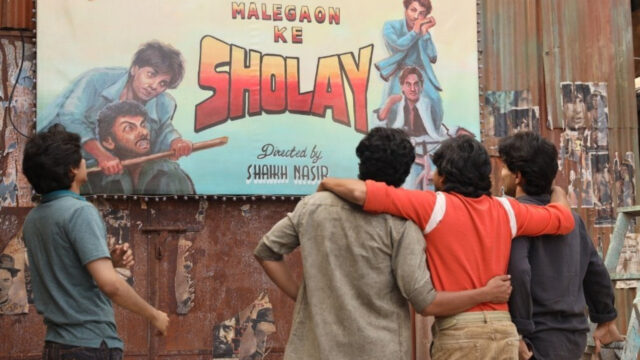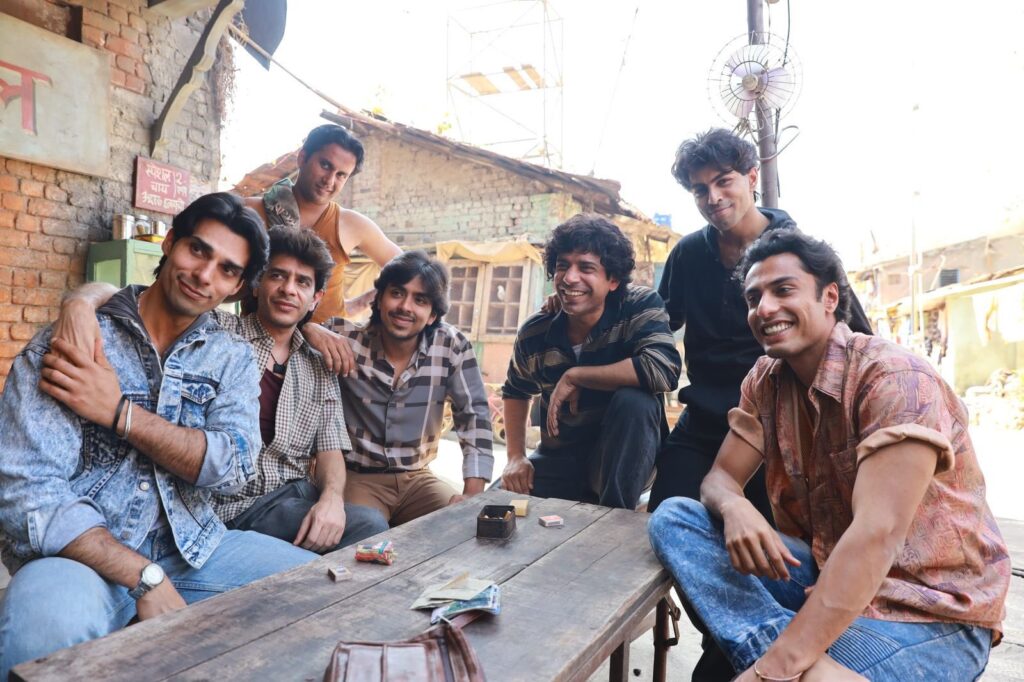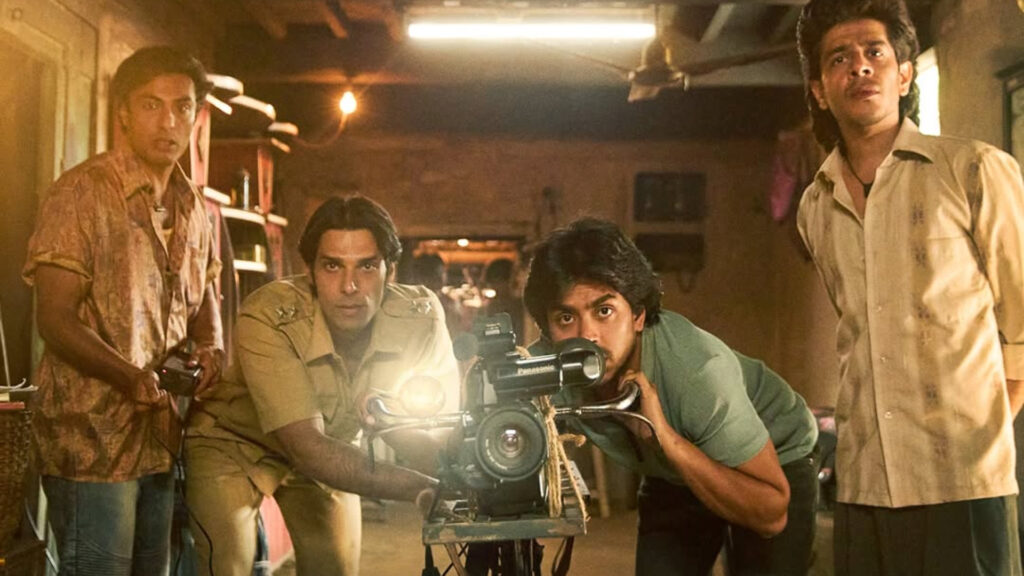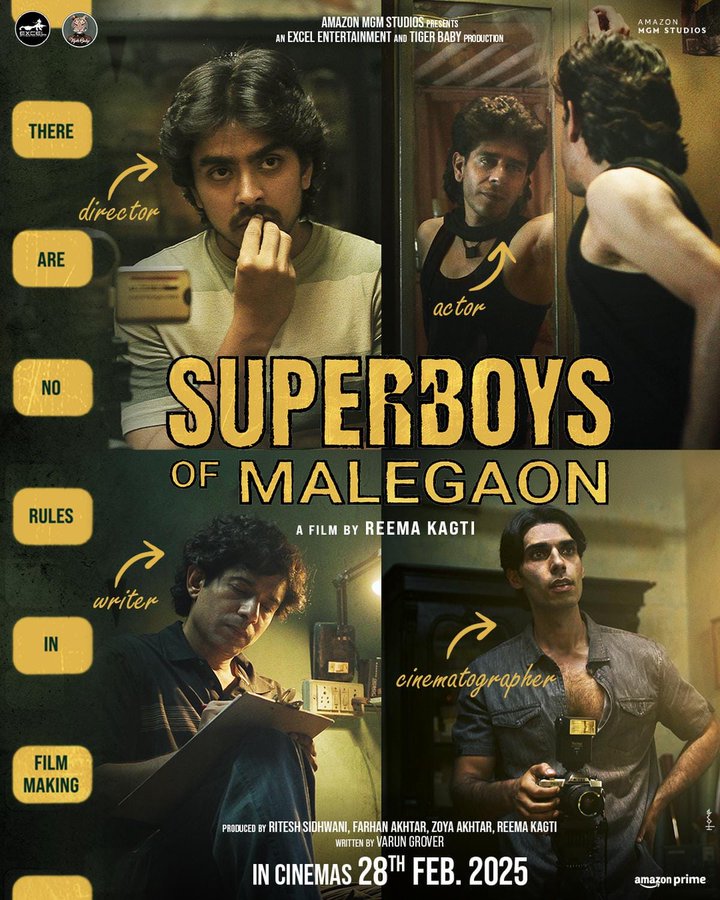
The sun rises. Fog-laden skies follow, moving into aerial shots of the gumbads of many masjids. It cuts to a window opening, catching some angular light, before cutting to the door of a shop being unlocked. Through an almost deep-focus frame, a young man, Nasir (Adarsh Gourav), perhaps in his early twenties, hurriedly walks to his shop. He unlocks the door of what looks like a video parlour and orders his assistant to quickly start cleaning. We cut to a lean man in his twenties, Shafique (Shashank Arora), wearing a skullcap, as he steps down the stairs of his house. “I’m off to duty,” he tells his khala before disappearing into the day. A smooth jump cut takes us to a printing press. Farogh (Vineet Kumar Singh), a hopeful writer, hands his nazm to the editor. “It will get published, right?” he asks, the question hanging. The editor, barely looking up, says, “I’ll try.” As Farogh walks out, framed through caged window panes, the disappointment in his eyes says everything words could never.
That is the beauty of the opening minutes of Reema Kagti’s Superboys of Malegaon. The filmmaking is so lean, so sharp, that it reveals everything you need to know about Malegaon and its people, without ever pausing to explain. It offers glimpses of life, yet within those lies an entire lifetime, distilled. The opening does not stop here though. The pace quickens as Shafique rides to work on his cycle, trading easy banter with his friend Irfan (Saqib Ayub), who seems late in opening his shop. Another friend, Akram (Anuj Duhan), in his photography studio, captures newlyweds with a mix of precision and indifference. Elsewhere, Allem (Pallav Singh) teaches the structure of an Urdu ghazal to a small class. They move through their days as if nothing else exists. As if this is all there is; and all there ever will be.
Nasir is careful, no crack or window hole must disturb the projection in his video parlour. Shafique works at the loom as if he were born to it. Irfan, worn down by his shop’s monotony, has made peace with his boredom. Farogh sharpens his hands not on paper but on the carrom board. While Nasir, in his spare hours, works as a videographer with Akram. Is it to earn more? Or perhaps to capture something that brings him closer to the projector screen he guards so carefully. But in Malegaon, he is not the only one who cares about that screen. Because life here feels like nothing, until there is a movie release. All it takes is a few reels of film, arriving first by bus, then by van, to a local single screen that draws the town together. Soon, they are slipping away, from work, from life, towards the theatre. Soon, they are no longer alone but a crowd, swaying in unison as Salman Khan makes his grand entry in David Dhawan’s Judwaa.
There are many ways to read this opening. Or even the larger film Reema Kagti has crafted, with a screenplay by Varun Grover. One might see it as a story of underdog ambition, where Nasir and his group of cinephile friends defy all odds to make their own films. In that sense, it could be read as a film about filmmaking itself. It could be read as a reflection on how the love for cinema drives many to madness, how it bridges many gaps and binds many together. It could be read as how cinema is both an escape and a reality we hold on to. As compelling as these readings are, that is not quite what the film seems to suggest. For those interpretations, there already exists Faiza Ahmed Khan’s remarkable 2008 documentary, Supermen of Malegaon, which captures the real Nasir and his friends as they chase their cinematic dreams.
After all, Supermen of Malegaon is potent for so many reasons that viewing Superboys of Malegaon through the same lens feels diminished. It becomes a sanitized depiction of a life we have already seen in all its jagged, messy truth. And why would storytellers like Grover and Kagti revisit the same tale of underdog grit and cinephilia that the documentary so vividly captured? They are after something else here. And the opening sequence offers glimpses of it.
That is a simple story of friendship.

Cinema is merely the excuse, the incidental spark that draws these friends together. They do not gather for the sake of movies; instead, movies become the language through which their bond is forged and tested, stretched and softened over time. On the surface, the film follows Nasir as he crafts some of Malegaon’s most iconic films. It traces how a once-passionate cinephile gradually becomes a formulaic filmmaker. It depicts how a friend who once stood by his buddies begins to lose them, and with them, their respect, as he grows into a self-centered artist. In this sense, the film feels like a natural extension of the Excel Entertainment legacy — a hat tip to the friendship sagas (Dil Chahta Hai, Zindagi Na Milegi Dobara, Kho Gaye Hum Kahan) they’ve long championed.

However, Kagti and Grover suggest that if cinema can break bonds, it can also mend them. It becomes the invisible thread that pulls people back together. Again and again. So, what if Nasir loses his friends? Through the same films, he finds his way back to them. So, what if he falters as a filmmaker? In the end, he triumphs as a friend who just happens to love the movies. After all, this is not the story of his coming of age as a filmmaker, but that of a friend who realises that perhaps he fell for cinema because it gave him the companionship he might never have found without the dark glow of the projector. It is the story of a lover who cannot afford the luxury of grand gestures, so he steals moments in his video parlour, slipping into the shadows with his girlfriend as Bruce Lee fights his way through the screen. It is the story of a husband, married against his will, who, on his first night together, says to his partner a line that feels borrowed straight out of a Karan Johar film — “Let’s try being friends first.”
In these ways, the film becomes far more intimate than the documentary. It is no longer just about the movies but the lives unfolding between them. It is about those closing moments that symbolically mirror the opening, not simply bookending but sealing its heart. If the opening shows cinema as the thread pulling these friends into each other’s orbit, the end reveals how that same thread mends what was broken. If the opening sets their bond in motion, the closing lifts it.

As they gather again, drawn from their scattered, worn-out lives, cinema yet again holds them still. Even as their eyes stay fixed on the screen, they cannot help but glance at each other. It is that feeling of catching a moment on screen and instinctively turning to the friend beside you. It is that feeling when you discover something so rare, you want to hold it close but also share it with the ones who matter. That feeling when cinema stops being an art form and becomes something deeper; because it sees you, hears you, and, for a moment, holds you together. For Nasir, Akram, Farogh, Irfan, and Allem, this is more than giving Shafique the stage he always deserved. It is an offering of the love they once found on the screen but forgot to give each other. It is about giving their friendship another chance. Their film may feel like a triumph, but beneath it lies the simple joy of being together, of sharing something larger than themselves. The sun rises again, clear this time. No fog, no distance. Just them, and the bond they carry, soaring on and off the screen.
Read more entertainment news and latest updates, exclusive interviews, features, reviews of movies and web series on The Movie Mail.














